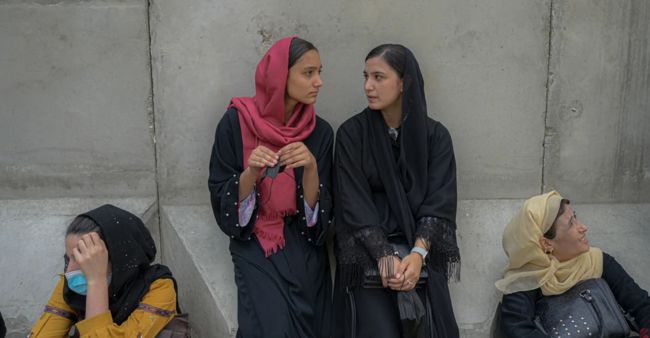Taliban’s latest decree has outlawed women’s beauty salons in Afghanistan. It is the latest curb on the rights and freedoms of Afghan women and girls, following edicts barring them from education, public spaces and most forms of employment. A spokesman for the Taliban-run Virtue and Vice Ministry, Mohammad Sidik Akif Mahajar, did not give details of the ban. He only confirmed the contents of a letter circulating on social media.
The ministry-issued letter, dated 24 June, conveys a verbal order from the supreme leader, Hibatullah Akhundzada. The ban targets the capital, Kabul, and all provinces and gives salons throughout the country a month’s notice to wind down their businesses. After that period, they must close and submit a report about their closure. The letter does not give reasons for the ban.
Its release comes days after Akhundzada claimed that his government had taken necessary steps to improve women’s lives in Afghanistan. However, it drew criticism from human and women’s rights defenders on social media.
The United Nations on Tuesday also said it was engaged with the authorities in Afghanistan to get the ban on beauty salons reversed. The UN mission in Afghanistan, or UNAMA, took to Twitter, urging the Taliban to halt the edict. “This new restriction on women’s rights will impact negatively on the economy and contradicts stated support for women entrepreneurship,” it said.
Earlier, one beauty salon owner said she was her family’s only breadwinner after her husband died in a 2017 car bombing. She did not want to be named or mention her salon for fear of reprisals. She said eight to 12 women visit her Kabul salon daily. “Day by day, they (the Taliban) are imposing limitations on women, Why are they only targeting women? Aren’t we human? Don’t we have the right to work or live?”
Despite initial promises of a more moderate rule than during their previous stint in power in the 1990s, the Taliban have imposed harsh measures since seizing Afghanistan in August 2021 as US and NATO forces were pulling out. They have barred women from public spaces, like parks and gyms, and cracked down on media freedoms. The measures have triggered a fierce international uproar, increasing the country’s isolation at a time when its economy has collapsed, and have worsened a humanitarian crisis.
In a personal interview with me (Amit Kumar), Former Afghanistan Forces Advisor, Stephen Jensen, emphasised the connection between women’s exclusion from the workforce and the subsequent decline in family income and purchasing power. Jensen elaborated on how this decline has played a pivotal role in driving the notable surge in Afghanistan’s exports, corroborating the findings of the recent UN report on the country’s economic
The success stories of great nations bear witness to an equal share of women’s contributions. Conversely, the escalating atrocities and regressive laws imposed on women by the Taliban hinder their legitimacy and demonstrate their incapacity to govern in alignment with global standards. Such actions attract heightened criticism and further underscore the Taliban’s inability to operate within the framework of a modern governance system.
The recent virtual SCO meeting on 4 July 2023, has drawn criticism for its failure to condemn the diminishing sphere of women in Afghan society resolutely. While the Western world has been vocal in criticizing the ongoing human rights violations, particularly concerning women’s rights, regional countries have shown a lukewarm response to addressing the issue. This discrepancy raises concerns about the commitment of these regional countries to advocate for the rights and well-being of Afghan women.
The governing model of Akhundzada and his Ulemas, based in the caves of Kandahar, is significantly impacting the social fabric of Afghanistan. According to a recent UN report on Afghanistan, Akhundzada unilaterally dictates the terms of governance without consulting or informing the Cabinet ministers in Kabul, often resorting to voice notes as a means of communication. This approach has sparked discontent among some individuals within the corridors of power in Kabul, leading to divisions and rifts within the Taliban itself. The lack of inclusivity and transparency in decision-making processes exacerbates internal tensions and challenges the cohesion of the Taliban movement.
In a recent interview, Ahmed Rasheed, a renowned journalist covering the Af-Pak region, expressed grave concerns about the current state of the Taliban. According to Rasheed, the new generation of Taliban fighters and the influx of young blood have taken their extremism to even greater levels than witnessed in the 1990s. His sentiment was echoed by Shiv Shankar Menon, India’s former National Security Advisor. The situation in Afghanistan is rapidly deteriorating, with alarming consequences. It is now imperative that neighbouring countries assume responsibility and take concerted action to restore order within Afghanistan, particularly for Afghan women and girls. Their dire conditions are unbearable and demand urgent attention from the regional community.
Amit Kumar is a doctoral candidate at BITS PILANI; Adjunct Researcher at The MirYam Institute in New York.
Hasmat Vejdani is a foreign policy analyst from Fairleigh Dickinson University, USA. He is an Afghan national based in the US.

